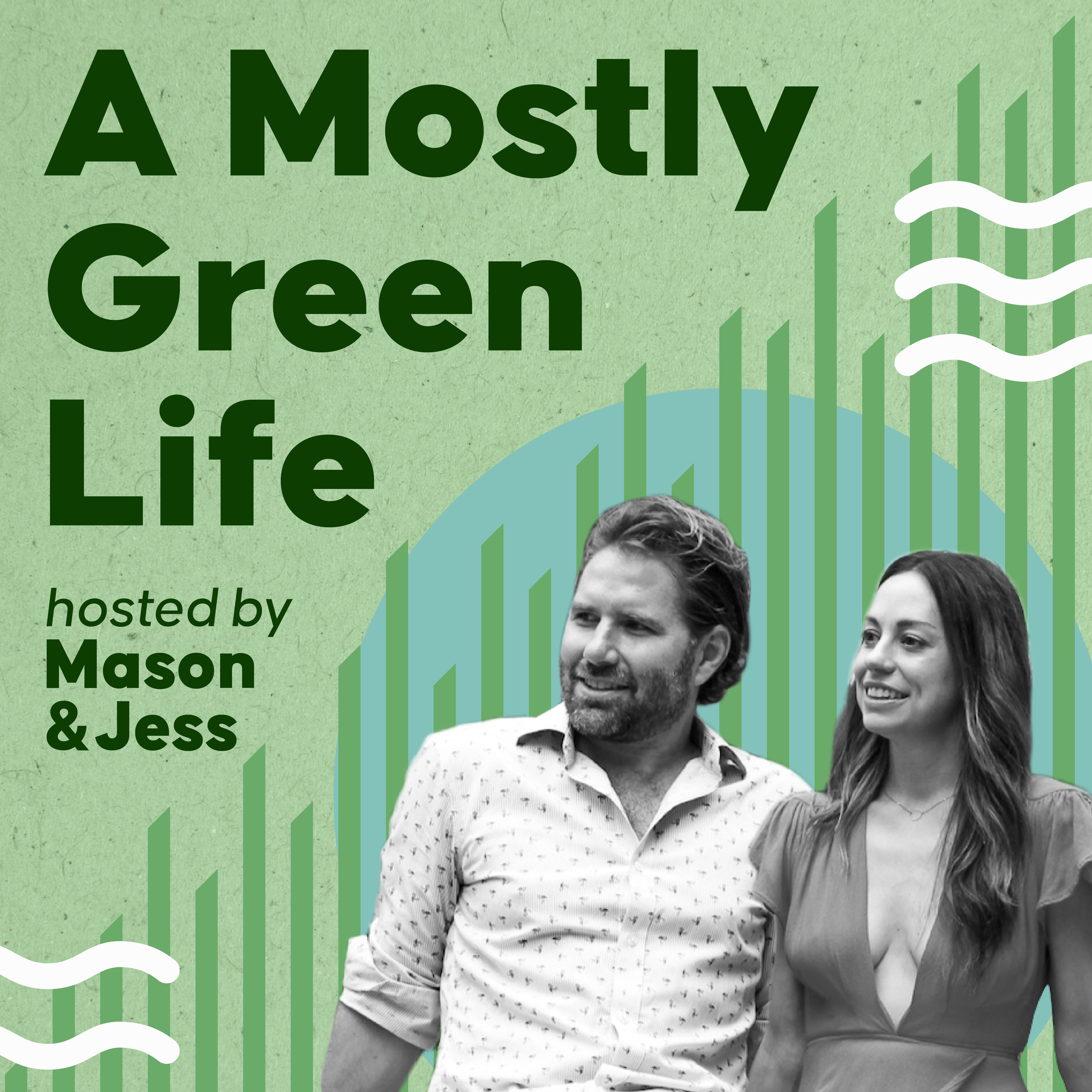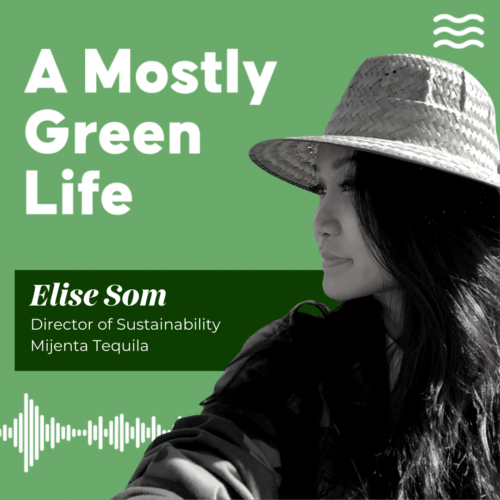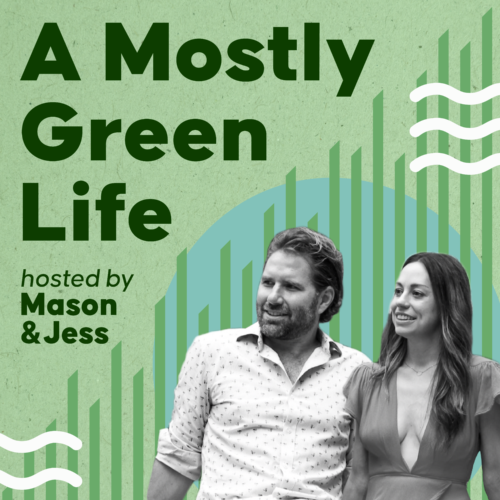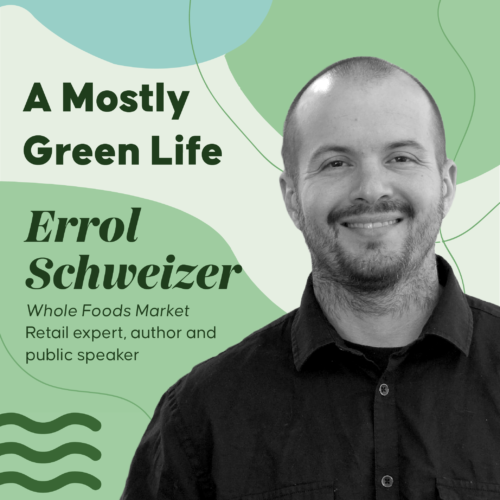Welcome to A Mostly Green Life podcast! Founded by sustainability nuts Mason Arnold and Jessica Kezar, in this episode, the duo shares how their individual eco-journeys got started, what prompted the this new eco-venture and their takeaways from the first few podcast recordings. Listen and subscribe wherever you get your podcasts.
Pretty ok transcript (AI-driven so some errors):
[00:00:00] Mason: Welcome to mostly Greenlife podcast. I’m Mason, and you very likely have no idea who we are. So today we’ll introduce ourselves and what we’re up to with this podcast and community. Jess, How’d you get here?
[00:00:19] Jessica: So I’ve always thought I led a generally healthy lifestyle through my food choices, but it wasn’t really until my first big girl job where I truly started learning about the impact that food has on your body and your overall health and the importance of choosing organic when you can.
So I started my career at nurture me. It was a baby food company that was founded here in Austin, Texas. And through being their marketing manager, I was introduced to all of these massive trade shows like natural products expo east. And it really made me start questioning the food choices I was making.
They had tons of better for you brands. And honestly, all of the products that I saw, there were nothing like what I grew up eating or snacking on. Um, or what you traditionally would see at retailers, like M and M ice cream sandwiches and Funyuns and Oreos.
[00:01:05] Mason: And, and didn’t you, did you put sugar on your fruits or what, what was the worst thing?
[00:01:10] Jessica: I did put sugar on my watermelon because that’s much better than salt on watermelon, but I did also put sugar on like frosted flakes and on my pancakes and syrup. So, I guess I shouldn’t say always had a healthy lifestyle. I was like a child then, but like through high school and college, I definitely started pivoting into better products, but yeah, through all of that, it propelled me to learn more about the food and determine what’s best for me and my body.
Since we all know that each of us are unique and not everything works for everybody. And after the baby food company, I started working at Cece’s veggie co, which makes pasta out of fresh. And CC sources, all of their organic veggies, all across the country and in Mexico. And I got the opportunity to go to a few of these farms and do some visits, and it was really great and amazing to just see the massive fields of organic goodness and the amazing people who run and work the farms, as well as the operations.
It just blew me away. And it really took me even further into my food journey and made me more curious about where my food was coming from. You know, it was it organic. And if it wasn’t what pesticides were being used on this. What were some potential side effects of those pesticides, et cetera. So that just took it one step further than from what are you eating, but also where is it sourced from and what practices are those farms using and abiding to?
[00:02:23] Mason: And what are the things in it that you can’t see? Exactly.
[00:02:25] Jessica: Yeah. Cause you don’t know from. Shelf what’s being used on it or sprayed on it. So, yeah. And so through my years from working at CCS, I got to spend time and get to know you Mason, my now fiance. And you’ve had a large part in my journey as well, given your background and you know, your passion for the environment and just truly being a sustainability net.
It’s been infectious to say the least. And ever since my questions have gone beyond food, like what are in the cleaning products we use in our home? Where did these clothes come from on my back? And what materials were they made from? And are there plastic alternatives we should be using, et cetera. So the list kind of goes on and on and disclaimer, I’m not an expert in any of these subjects and that’s okay.
That’s all right. This podcast is about asking experts, questions, and us learning from them. And what mostly green is really all about is being a community for everybody, no matter where you’re at on your eco journey. I’m excited to learn and explore all of the things together.
[00:03:25] Mason: And I’m excited to keep exploring with you, Jess and I come from the world of engineering.
If you can believe it. I graduated from UT Austin, both hail from Texas. I was actually raised in Austin though. And while Jess was raised in San Antonio, she got here as soon as she could. So I graduated with a degree in chemical engineering and really didn’t think much of environmental conservation. I started working for an environmental consulting company here in Austin.
That was primarily helping oil and chemical companies file permits with the TCEQ, which is the environmental regulating body here in Texas. I really didn’t go in with any bias, but seeing firsthand the chemicals that were being dumped constantly, just pipes flowing into the environment. Led me to start asking a lot of questions and I didn’t like the answers at all.
One day two reports came across my desk. One that said organic landscaping was superior to chemical landscaping and chemical fertilizing in every way. Short-term, long-term greener, healthier, more disease resistant. And the second one said that the number one pollutant to Texas waterways was residential fertilizer.
So I started my first company, environmentally responsible landscaping, and that kicked off what is now a 20 year professional journey in sustaining. I’ve started and sold several companies and my latest company, CCS, as she mentioned, making POS out of fresh vegetables, landed number three on the Inc 5,000 list of the fastest growing companies in the country.
Now you want to talk about. Sustainability challenges when a company’s growing that fast, it was quite a journey and we were managing to maintain zero waste while processing millions of pounds of vegetables every month. We thought about it every day. But the funny thing is I feel like I’m still learning so many things.
My companies have helped develop local food systems and massively reduced waste streams standards in the food industry. But at home, I still forget if the thing I’m holding, it looks like plastic, but says it’s made from plants. Does it go in the trash, the recycling or the compost reading food labels is getting more complex every day.
And so many new technologies claim. They’re better for the planet, but regulators I know are hardly. There are 10,000 new chemicals invented, meaning things that didn’t exist on the planet. And we have no idea how they ultimately will interact with the planet every single year, 10,000 every year. There’s just so much to keep track of these days and so much misinformation and disinformation.
How do we know what’s real? What’s helping and what’s. Yeah.
[00:06:12] Jessica: And that’s what we’re here to find out. So whether you’re just starting to think more green or eat clean, or have been on a mission for years to foster some sort of change in this world, we want to get to know you and together we can learn, grow and dig into some really interesting topics while having a ton of fun.
Because honestly, life has got to be fun.
[00:06:29] Mason: Absolutely. Look, we love to enjoy life and we love to party and we want to party sustainably. We love to socialize with our friends and travel and we want to make the best choices we can along the way, too. A lot of people you’re not really helping the planet unless you’re living in a yard in the woods completely off.
And that’s awesome, but that just doesn’t
[00:06:49] Jessica: work for us. And it probably doesn’t work for a lot of people. Yeah.
[00:06:52] Mason: So let’s figure out how to have it all or at least keep trying to have it all. And knowing that it might be impossible. We want to figure out what the baby steps and or biggest steps are that we can all do to help live sustainably.
[00:07:05] Jessica: And we’ll also be highlighting some really amazing people and companies who are working for the planet, even if that’s not necessarily in there. We’ve got some really cool guests lined up that will join us and help educate all of us on the steps we can take, whether they’re small or large to help make a difference.
Some of them might surprise you how they’re having a positive impact on the planet, because it’s not obvious and they’re not screaming it from the mountaintop.
[00:07:28] Mason: We think everyone is connected to sustainability and we want to learn at all now to be sure we’re just two people who bought some sound equipment.
So early episodes, we’re kind of winging it a little bit. So please give us your feedback as you listen to. What could we have done better? What would you have liked us to ask the guests? We found each episode so far. I mean, just absolutely fascinating. And I’ve learned tips and tools that we immediately implemented in our lives.
And we hope you get the same thing, Jess. What’s been one thing you can tease out that has been extremely interesting to you so far.
[00:08:00] Jessica: So I love wine, I guess we both love wine, so I’ll start there. Um, I was surprised to learn about all of the potential ingredients in. Uh, I guess not ingredients they’re either like additives or agents processing agents.
Gotcha. So that was one thing. And then I also really loved the free science curriculum programs that Monterey bay aquarium offers teachers for grades K through 12. What about you?
[00:08:22] Mason: Mason, part of our household waste deep dive coming up. I was surprised at what can and can’t go into the recycling bin. I’ve definitely been doing some things wrong and yes, I’m a little guilty of wish cycling on occasion.
[00:08:35] Jessica: So which cycling is when you’re unsure of something can be recycled or not. So you just do it and you hope that it gets recycled. There’s actually a lot less that can go in the bend than we thought and putting extra things in there, actually contaminates it. And then the whole thing can get
[00:08:48] Mason: thrown away.
It look while a lot of the conversations we’ll be having, I’ve been talked about by many people before we think we bring a little bit of a unique perspective. My engineering background makes me as skeptic about a lot of things, but it’s also given me a ton of curiosity and problem solving skills. I love to try and remove my biases and evaluate things from a thorough and balanced
[00:09:10] Jessica: perspective.
And what do you mean
[00:09:12] Mason: by that? Well, I tend to research things significantly more than most people before making decisions. That’s true. And I have the background to really get down to the nitty gritty. I want to know, not just if something is better for me or the. But why and how much we’re bombarded with news about things that are bad for us or the planet and things that are going to cure us of all of our elements, but we’re all in different situations.
Everybody’s body is different. Everybody’s environment is different and things that are bad for some of us are good for others. And some things while technically are bad for them. Really just pale and comparisons to the other things we impact. The recent straw campaigns generally had a small impact on the environment, but they were also extremely easy to do, right.
Paper, straws, and compostable straws have advanced. So as to be a viable alternative, and everyone demanding replacement. So we want to dig into things like that. Let’s measure how good or bad changes in our life are and weigh that against how much they change our lives. Everything is such a complex journey.
And we just want to share in that journey with people like us and all help each other, keep moving forward. Even if sometimes we take few steps back
[00:10:26] Jessica: and sometimes Mason, you can get really deep and philosophical. Things. And though that’s relatable to some, hopefully together we can keep things fun and make sure we all get back to the practical lessons about sustainability.
[00:10:40] Mason: Great to me. So we had the idea for this podcast, but we weren’t really sure how to get started. There’s just so many things.
[00:10:47] Jessica: And one day we maybe had one too many margaritas and you suggested that we drive around the U S learning about sustainability for a whole two months. So we’ve had an RV for a while, but this would be by far the longest.
And to add some complexity. We have masons two kiddos halftime. Co-parenting them taking a trip as halftime. Parents requires some real logistics and coordination. Luckily, the kiddos have a wonderful mom that we get along great with and the kids were just old enough this year that they felt comfortable as well as we did sending them on a plane as unaccompanied minors.
We’re looking forward to conversations about sustainability and co-parenting because that requires coordination as well. If you’re an expert.
[00:11:26] Mason: So we recorded some episodes on the road and also toured some wonderful sustainability projects. We’ll share with you through our YouTube channel. So here we are schedule full of learning and sharing.
[00:11:38] Jessica: We’d love your help and support by subscribing to our podcast, wherever you listen, which you’ll get notifications of each new episode every week, please also comment and leave reviews. So we know how to improve and adjust future episodes.
[00:11:49] Mason: If you’re here in the us around launch, you’re extra lucky. Cause we’ve got a giveaway going on with the grand prize, being an eco vacation for two to Billy’s and other prizes totalling over $15,000.
You can head on over to our website and mostly green.life to check it out and see all the ways you can
[00:12:06] Jessica: attack. If you like what you hear and want to support us consider also joining the mostly green crew on our way. With a small monthly subscription, you’ll help us upgrade all the things as well as be automatically entered into a giveaway each week, announced on the podcast for just the mostly.
We’ll be giving away the products we love and use on a daily basis so that they can hopefully help you move towards sustainable living as well.
[00:12:28] Mason: And again, please send us all of your feedback. We want to make this as fun and educational for you as it is for us.





